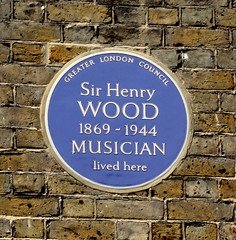Sir Henry Wood CH FRCM
Sir Henry Wood CH FRCM
(1869-1944)
musician, Fellow of the Royal College of Music, Knight Bachelor (from 1911), and Companion of Honour (from 1944)
Commemorated on 3 plaques
Sir Henry Wood 1869-1944 musician lived here
4 Elsworthy Road, London, United Kingdom where they lived
The Queen's Hall 1893-1941. Site of Britain's leading concert hall where Sir Henry Wood founded The Promenade Concerts in 1895. The Queen's Hall was destroyed in The Blitz of 1941.
Henry Wood House, Langham Place, London, United Kingdom where they founded the promenade concerts
The Church of the Holy Sepulchre known as St Sepulchre Without Newgate. Built on the site of a Saxon church dedicated to St Edmund the church became known as St Edmund and the Holy Sepulchre. Late, the name became abbreviated to "St Sepulchre". Rebuilt and much enlarged in 1450, the walls, tower and porch survive from that period. Badly damaged in the Great Fire of 1666,the interior was restored in 1670 and has been much altered since. Among famour names associated with the church are John Rogers, Vicar, first Protestant martyr; Roger Ascham, Tutor of Queen Elizabeth I; William Harvery, discoverer of the circulation of the blood; Captain John Smith, first Governor of Virginia and Sir Henry Wood, founder of the Promenade Concerts, whose ashes rest in what is now the Musician's Chapel, with its many memorials to musicians. The church also contains the Regimental Chapel of the Royal Fusiliers.
Holborn Viaduct, London, United Kingdom where they interred



